- Home
- Howard Jacobson
Who's Sorry Now? Page 3
Who's Sorry Now? Read online
Page 3
So if he didn’t see himself as a pedlar, what did Kreitman’s father see himself as? Simple – a man with a round stomach and a bald head who wore silver-grey waistcoats and black mourning ties and drank whisky from cut-glass decanters. A sort of maître d’ in his own house. Everything else took from his dignity. Kreitman went buying with his father sometimes, accompanying him in silence from warehouse to warehouse in Stepney and Stamford Hill, where it upset him to see how cheerfully other purse sellers embraced the ups and downs of purse-selling, and how much they reciprocated his father’s icy loathing of them. There was always laughter in the warehouses, exaggerated comedy even when expected lines had not arrived, or returns were being dealt with, or someone was accusing someone else of pinching from his trolley. Everybody, from the smallest tuppenny-ha’penny stallholder in Brixton to the owner of the biggest bag arcade in Hammersmith, everybody including the person in the mobster suit and expensive wig whose warehouse they were in, rejoiced in the rubbish around which their lives revolved. ‘Look at this! Henry, look at what you’re asking me to buy. The clasp doesn’t fasten. The lining’s hanging out. The zip’s the wrong colour. And the dye’s coming off in my hand.’ ‘It’s fashion. It’s what the kids want.’ ‘Henry, you’ve been stocking this same bag since the Coronation. And it wasn’t in fashion then.’ ‘Morris, you know what your trouble is? You’re a short-term merchant. If I’ve been stocking this bag since the Coronation, what does it tell you?’ ‘That it’s such drek you can’t sell it.’ ‘No, that it’s such drek I can’t get enough. So how many do you want?’ ‘I’ll take a gross.’
Everybody making the best of the worst except his father, Bruno the Bagman, known to his fellow bagmen as Bruno the Broygis – that’s to say Bruno the Bad-Tempered, Bruno the Taker of Umbrage, Bruno the Bilious.
‘You’re not a bad kid,’ one of the bagmen took Marvin Kreitman aside to tell him once, ‘but if you want to know why we can’t stomach your old pot and pan, it’s because he acts as though there’s a bad smell under his nose all the time, and we get the impression that the bad smell is us. He’s a gantse k’nacker, you understand? He acts like a big shot, like he’s superior to us. But there’s something we all want to know. You tell me. What exactly is your father superior at?’
Marvin Kreitman, blushing to the roots of his hair, shrugged his shoulders. ‘You’ll have to ask somebody else that,’ he said. But he had no idea who that would be.
It also upset him to discover that his father stole from the warehouses, removing the newsprint and tissue-paper stuffing from briefcases and overnight bags when no one was looking, and filling them with key fobs and billfolds. Were they so badly off that his father needed to do that? No. His father stole as an expression of umbrage. He did it to spite. And who knows, perhaps to besmirch himself in his own eyes; to confirm his fall from a grace he hadn’t attained. And was he never found out? Years later, buying on his own account, Kreitman learned that his father’s petty thieving had been common knowledge, tolerated because he bought big – thought big, bought big – and also, it seemed, because those he stole from knew that Kreitman’s father was thereby slowly poisoning himself, and were content, for the price of a few key fobs, that his death should be as horrible and protracted as possible. Which it was. Not gallstones or ulcers or cancer that claimed him in the end. Strictly speaking there was no end. He just went on being himself until his constitution had had enough. Cause of death – if that which has never lived can the – gangrene of the personality. Unable to support it any longer, the body coughed up black bile streaked with black blood, collapsed in a bucket of Andrews Liver Salts and was gone. Six weeks after the non-event his mother took up with a man who didn’t think the world owed him deference because he looked like a Hungarian waiter, and cleared out the previous incumbent’s things. The market stalls she gave away. Washed her hands of them. The shops she sold. Kreitman got the decanters, which he donated, without unwrapping them, to Oxfam.
These were some of the reasons why Kreitman tried to remember to smile if he possibly could, did his best to memorise and tell jokes, cooked curries, never thieved a single book from the student bookshop, and became interested in Francis Place, the radical, a journeyman breeches-maker who had reason to believe he could have been better employed, but never repined, never turned his back on self-improvement, never stinted himself in a cause, never acted as though there were a bad smell under his nose and, as far as Kreitman’s searches could discover, never set much store by what he drank his whisky from.
Kreitman’s eventual turning of his own back on Francis Place, as good as abandoning all his researches into the great puritanical tradition of English radicalism, forsaking a university career and forswearing radicalism itself in favour, once and for all, of purses, was not to be ascribed, in Kreitman’s own view, to genetic or moral backsliding, but to the times. He had meant to be high-minded and disinterested at a historical moment unpropitious for any motive except advantageous low-minded selfishness. He remembered the hour everything he valued flew out of the window, the hour hobbledehoy Thatcherism blew its first triumphalist fanfaronade, sending disinterestedness orphaned into the night, where for years it could be heard shivering and scratching at windowpanes, like the ghost of a relation no one dared claim. It didn’t feel like cynicism, his abandonment of his projects, his reversion to family form – cynicism never does. Nor did it feel like defeatism. What it felt like was getting pissed. Just giving up on being sober for a night. There is no such thing as society, proclaimed Mrs Thatcher – always looking suspiciously pissed herself, sozzled more the word, her patent heels never less than precarious, like Minnie Mouse’s – and Marvin Kreitman, along with most other people, was mightily relieved to hear it. Three cheers for ourselves! It was like the lifting of an oppressive burden. Society, society! Was there to be no end to it? Society, the societal, the socio, the sociogenic, the sociographic, the sociosocio … Give us a break already! And she did. For even the most industrious won’t say no to a holiday when it’s the boss’s suggestion. Drinks all round on Mrs T! That was what it felt like to Kreitman, anyway – time off; not a greedy going to work at hard-heartedness, but a needful holiday from soft; in his particular case, a needful holiday from squishy. Though as it turned out, not even G&T and don’t spare the ice Thatcherism could prevent the tears from rolling down his cheeks whenever he had to remove himself, if only for a weekend, from the company of a woman he loved.
He remained a romantic, then, through all the every-man-his-own-island (every man own his own island) years, opening one shop after another, branching out from small leather to large luggage, hiring and firing and fucking in between? Oh, yes. Romantic, sentimental and, as night follows day – for where else can sentimentality lead? – perfidious. As loose as careless talk.
Leave the guy alone. His head banged and falling in love incontinently gave him some relief. He had climbed back into his father’s shadow scarcely before he’d left it – easy to do: he knew where all the warehouses were – and he couldn’t blame it all on Mrs Thatcher. He had married young and fathered two children, neither of which was her fault. And he had expensive habits over and above fathering, which weren’t her fault either. Not all her fault, though of course had she paid academics better …
False reasoning, and he knew it. All the money in the world wouldn’t have kept Kreitman in the academy. He felt wrong there, a traitor to something in himself. Maybe even a traitor to his father, to what his father did and should have done better. He felt ashamed, catching his reflection in leaded windows, striding through quadrangles with his books under his arm and students clinging to his gown, as though teaching even at that level still smacked of the servility of domestic service, like being a governess or the tutor to a rich man’s children. And even if it didn’t, what pride could a mature man take in being King of the Kids? Stay doing that till he was fifty and he’d have grown that parchment skin, neither old nor young, that mask of squandered sempiternity, which is the rew
ard for passing all your days in the company of eighteen-year-olds. Yet those of his university friends who went into commerce fared no better in his estimation either – slaves to some corporation, dirtying themselves not with notes but with the principle underlying notes, which was even worse. Whichever way you committed yourself you were demeaned; so better not to commit at all, to step outside and have a leg in both camps, and in that way to be fully recognisable to neither, a thorn in the flesh of each (as if either cared!) and a continuing puzzle to yourself.
Besides, in abandoning Francis Place, Kreitman wasn’t entirely abandoning Francis Place’s example. Place himself had opened a shop, improving his mind and doing much to improve the country’s on the back of a flourishing tailoring business. ‘I had three things continually in my recollection,’ Place wrote in an autobiography too unwieldy ever to be published in full. ‘The first, and by far the most important, was to get money, and yet to avoid entertaining a mercenary, money-getting spirit; to get money as a means to an end, and not for its own sake.’ And the other two things continually in his recollection? Kreitman knew them off by heart. Not to allow the ‘contumelious treatment’ he had received in his breeches-making days to make him a ‘sneaking wretch’ to those above him or a ‘tyrant’ to those below; and to be forever on guard against presumption and arrogance.
As a matter of more than passing interest to Kreitman, Francis Place went on, in the course of a long public life, to campaign for birth control and free love. Though not, of course, in any sensual spirit. And his second wife was an actress, named Mrs Chatterley. Though not, of course, Connie Chatterley.
Kreitman didn’t know why the chill wind of self-congratulatory integrity that blew through nineteenth-century English radicalism, utilitarianism, Moral Chartism and the like, appealed to him as it did. His hatred of his father explained it partly. He revered everything his father wasn’t. Principled Englishness, above all. He didn’t know where his father was from. It was never discussed. Kreitman assumed Hungary, but it could have been somewhere equally horrible. Romania. Bulgaria. Albania. The Balkans. One of the thin-skinned, contumelious countries. Not England, though, of that he could be sure. And for his own part, perhaps because of his mother’s example, he felt at home with long-winded moralists, loved the rapaciousness of their restraint. Give him a page of sententious prose, the gluttonous elaboration of the principles of self-denial, that tireless puritanism of the intellect which mowed down every frivolity in its path, and Kreitman was a happy man. Throw in a sentimental fuck with the mother of one of his lady-friends and he’d have called himself delirious.
He also liked selling purses. Proving it could be done, partly; proving it could be done with a good heart. But also he enjoyed testing his taste against the market. Seeing whether, in purses if in nothing else, he could harmonise himself with the spirit of the age. And he loved playing shop. The money part was necessary but not interesting to him. For accumulation for its own sake he had even less enthusiasm than Francis Place had. What interested him was what he already employed staff for – unpacking cartons, stacking shelves and making sales. Like Christmas, the physical excitement of taking receipt of stock. Like all his Christmases and all his birthdays rolled into one, counting the boxes, getting down on his knees and ripping open the cardboard, cutting his hands on the staples, breaking his fingernails in his impatience to snap the tape and see what was inside. Yes, yes, he knew already – obviously he did, since in those early days he was the one who did all the buying – but it pleased him to take custody of the new lines, to recall and reaffirm his original enthusiasm, expressed at some trade fair months before, and now to touch and smell it. Intoxicating, the cheap Moroccan wallets, squashed and flattened in their elasticated dozens, which he eased apart like squeeze-boxes, releasing their scent of oxhide, of urine, of all the dyes and spices of the kasbah. And more voluptuous still, the squeaky-tanned Italian handbags in smoky colours – brandy, Armagnac, blood-spot cognac – individually wrapped in branded, rusding paper, sometimes boxed, sometimes in linen shoebags (bags in which to keep your bags), ornamental as the Florentine bridge on which they’d been stitched, as still as works of art, answering as they never would again to the philosophical idea of handbag – the Platonic bag to which all other bags aspired – prior to the gross contingencies of use.
And then into the window with his sleeves rolled up, engineering his display on the simple joyous principle of ascent, the stock rising in vertiginous tiers like an Umbrian hill town. Why did he love that effect so much? One set of rooftops rising behind another. The purses and wallets first, then the handbags, then the vanity cases, then the sports bags, then the travellers and shoppers, and at last the suitcases. Infinity; was that it? Was he building a graduated Tower of Babel to the heavens, leaving no space for God to express His indifference? It looked shit, anyway, as his first manageress found the courage to tell him. Nobody had dressed a window like that since 1930. She was wrong, as he showed her, walking her up and down Tooting Broadway. Everybody in travel goods dressed their windows like that. She wrinkled her nose like a money pouch. Wasn’t that her point? Did that make it any less shit? He took her meaning and shortly after took her to bed. Mixing business with pleasure? No – mixing pleasure with pleasure. Do that wrinkle thing with your nose again. Make your loose change clink. But on the question of window-dressing he knew what he knew, the great lesson learned from his father – purses sell themselves. And cases too.
He surrendered in the end. Had to. Other people opened the cartons and other people designed his windows. He didn’t get it. One bag in a window – what kind of come-on was that? But the times were changing around him. He was an inordinate man, dumped into an age of minimalism. Little by little the smell of rutting camels faded from his nostrils. Purses grew plainer. Handbags more coldly sculptured. The briefcase with its once mysterious vertical recesses, its deep suede slits and dark concertinaed divisions, was now a moulded shell which opened horizontally with an empty-headed click. Even the lovely creaking leather satchel of his childhood had given way to the nylon sportsbag with ARSENAL printed on the side – more capacious, he granted, but less redolent of the hot, serious adventure of learning. Over time, fearful of his pertinacious taste for the bazaar, his staff began to dread his appearances; all he had to do was take off his jacket and start to roll his sleeves up and he’d hear them groan. What choice did he have but to leave them to it? He looked away, distanced himself from the fun of shops and just opened more. A reluctant tycoon. And because his head banged and his heart squelched – accept that a man must somehow express the inordinacy of his emotions – a sentimental votary of love, looser than gossip.
Tonight, though, by one of those queer reversals incident to an old intimacy, it was Charles Merriweather whose eye was squeaking loosely in its unprotected socket, pending the arrival of his coronary elicoidali. ‘She’s gorgeous,’ he said, meaning almost anyone.
Almost anyone, thought Kreitman, shaking his head, who happens not to be his wife. He didn’t bother to follow his friend’s gaze. He knew its promiscuity. Anything on two legs. Fewer, if fewer were all there were. No pattern, no coherence, no discernible predilection, nothing that answered, say, to Kreitman’s refined and, when you thought about it, wholly consistent preference for mothers of women he liked. Simply skirt. Not for the first time, Kreitman was almost ashamed to be seen out with Charlie Merriweather. These constant husbands! Christ! These unispousal gallants! Daring to pronounce the phrase nice sex with a mouth full of dim sum one minute and then to be up for every other sort the next. So what kind of sex was this which Charlie couldn’t deny himself, squirming around in his low-backed steel chair, lapping at everything that clattered past – not nice or nicer?
‘Charlie, she’s young enough to be your reader.’
‘Oh, crikey, is she? Nice, though.’
So there – not nicer, not not nice, simply nice, simply as nice.
After more than twenty years of veering from the str
aight and narrow, Marvin Kreitman wondered if he had only now touched the bottom of betrayal. As nice. Eeny meeny miny mo. Shall it be you or shall it be you? True, the cesspit of sameness of which poor Charlie had vouchsafed him a glimpse was only in his head, but was that what the insides of the heads of all good husbands necessarily looked like? In which case which of them was the better husband – Charlie, who would do unto others (if he could) exactly what he did unto his wife (if she still let him), or himself, Marvin the Cad Kreitman, who knew what he liked but never, on principle, felt the same way (tears apart) or spoke the same words twice?
Kreitman gave in to a twinge of concern for the other Charlie. He was marginally responsible for their marriage, having introduced them, on a hunch, at a student party. Charlie, meet Charlie. He had pulled her out of a chair for himself at first, liking her long lolloping milkmaid’s body, her boxer’s jaw and her unexpectedly tiny hands. ‘Oh, God, I don’t think I can,’ she had laughed, meaning do the dance of the hour, the Bump. ‘Nonsense,’ Kreitman had said, ‘you’re built for it.’ And she was. When Charlie bumped you you stayed bumped. ‘Try to be more rubbery,’ he suggested. ‘Try to bounce off the other person’s hip, and also not to put the other person in hospital.’
‘Oh, God, I’m sorry. I did tell you. You can put me back where you found me, if you like. I don’t mind if you pass on me.’
He didn’t do that, but he did decide to pass her on. She was a happy find, a lovely girl, brimming over, beyond the common, exciting at some level, maybe potentially exciting, exciting in the bud, but she was just too raw for him. The vegetable in her seemed to outweigh the animal. He smelled parsnip on her. She made him think of the frost-hard earth. And of those English counties he found least congenial. Given the choice, he went for women who evoked the inside rather than the outside world, women who whiffed of chemical things, perfume rather than sward, and who had shiny surfaces like him, who reflected light rather than bled it out. But he believed he knew the very panting puppy to go snuffling after her skirts as she traipsed across the golden glebe. And he was proved right. It worked. They adored each other from the off. No sooner were the Charlies an item than she was dressing him, not altering the way he looked exactly, for he was close enough already to perfection in her eyes in his shambling cords and thick all-season lemon socks, but actually doing the buying for him – comprehensively, cap-a-pié, not just the handkerchief for his hacking jacket, or the knitted ties for his Vyella shirts, but the shirts themselves, the big parsnip-tramping shoes, the loose vests, the floppy pyjamas, the vast underpants. Look under the table this very evening and there were Charlie’s sturdy limbs encased in chinos Charlie chose for him from a catalogue. They went from strangers to familiars, knowing everything about and concealing nothing from each other, coining nicknames – she Chas, he Charlemagne – in a matter of hours. He became her child, yes, that was easy to see. And even Kreitman, as a rule squishier hearted about himself than his friends, could not begrudge him that. Poor Charlie had been subjected to the freeze of sensible parenting, ordered about and made downcast by a mother who believed she was failing of her maternal responsibilities if she didn’t remind her children at least twice a day that she believed them to be nincompoops. ‘Doesn’t do for a person to have ideas above his station, or for a child to think he has brains when he hasn’t,’ she told Kreitman when she met him for the first time at Charlie’s wedding. ‘What do you think of this girl, then?’

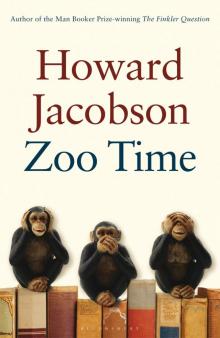 Zoo Time
Zoo Time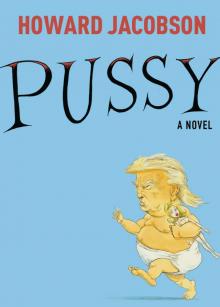 Pussy
Pussy The Dog's Last Walk
The Dog's Last Walk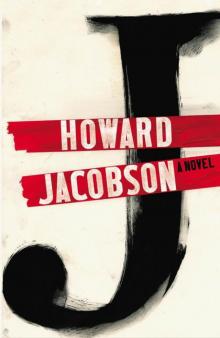 J
J Shylock Is My Name
Shylock Is My Name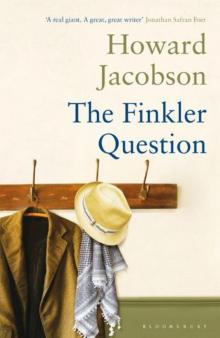 The Finkler Question
The Finkler Question The Mighty Walzer
The Mighty Walzer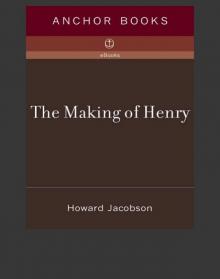 The Making of Henry
The Making of Henry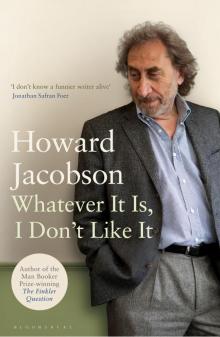 Whatever it is, I Don't Like it
Whatever it is, I Don't Like it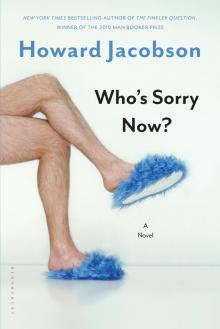 Who's Sorry Now?
Who's Sorry Now? Kalooki Nights
Kalooki Nights